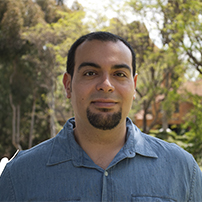January 13, 2014:
 Caffeine is the energy boost of choice for millions who consume it to wake up or stay up. Now, UC Irvine neurobiologist Michael Yassa has found another use for the stimulant: memory enhancer.
Caffeine is the energy boost of choice for millions who consume it to wake up or stay up. Now, UC Irvine neurobiologist Michael Yassa has found another use for the stimulant: memory enhancer.
Michael Yassa, assistant professor of neurobiology & behavior, and his team of scientists found that caffeine has a positive effect on long-term memory in humans. Their research, published Jan. 12 in the journal Nature Neuroscience, shows that caffeine enhances certain memories for up to 24 hours after it is consumed.
“We’ve always known that caffeine has cognitive enhancing effects, but its particular effects on strengthening memories and making them resistant to forgetting has never been examined in detail in humans,” Yassa said. “We report for the first time a specific effect of caffeine on reducing forgetting over 24 hours.”
Yassa joined UC Irvine on Jan. 1. Yassa’s team completed the research at Johns Hopkins University before the lab moved.
The researchers conducted a double-blind trial in which participants who did not regularly eat or drink caffeinated products received either a placebo or a 200 milligrams caffeine tablet five minutes after studying a series of images. Saliva samples were taken from the participants before ingesting caffeine, and one, three and 24 hours afterwards to check for increased caffeine levels.
The next day, both groups were tested on their ability to recognize images from the previous day’s study session. On the test, some of the visuals were the same as from the day before, some were new additions and some were similar but not the same as the items previously viewed. Researchers say more participants in the caffeine group were able to correctly identify the new images as “similar” to previously viewed images versus erroneously citing them as the same.
The brain’s ability to recognize the difference between two similar but not identical items, called pattern separation, reflects a deeper level of memory retention, the researchers said.
“If we used a standard recognition memory task without these tricky similar items, we would have found no effect of caffeine,” Yassa said. “However, using these items requires the brain to make a more difficult discrimination – what we call pattern separation, which seems to be the process that is enhanced by caffeine in our case.”
The memory center in the human brain is the hippocampus, a seahorse-shaped area in the medial temporal lobe of the brain. The hippocampus is the switchbox for all short-term and long-term memories. Most research done on memory – the effects of concussions in athletics to war-related head injuries to dementia in the aging population – are focused on this area of the brain.
Of the few studies done on the effects of caffeine on memory, the general consensus was that it has little or no effect on long-term memory retention.
Yassa’s research is different from prior experiments because the subjects took the caffeine tablets only after they had viewed and attempted to memorize the images.
“Almost all prior studies administered caffeine before the study session, so if there is an enhancement, it’s not clear if it’s due to caffeine’s effects on attention, vigilance, focus or other factors. By administering caffeine after the experiment, we rule out all of these effects and make sure that if there is an enhancement, it’s due to memory and nothing else,” Yassa said.
According to the U.S. Food and Drug Administration, 90 percent of people worldwide consume caffeine in some form. In the U.S. alone, 80 percent of adults consume caffeine every day. The average adult takes in about 200 milligrams – the same amount used in the Yassa study – or roughly one strong cup of coffee or two small cups of coffee per day.
“The next step for us is to figure out the brain mechanisms underlying this enhancement. We can use brain-imaging techniques to address these questions,” said Yassa, who received his doctorate in neurobiology & behavior at UC Irvine in 2010. “We also know that caffeine is associated with healthy longevity and may have some protective effects from cognitive decline like Alzheimer’s disease. These are certainly important questions for the future.”
Media Contact:
Tom Vasich
949-824-6455
If you’d like to learn more about how you can support the faculty and research at the Biological Sciences School, please contact Andrew DiNuzzo at 949.824.2734 or adinuzzo@uci.edu.
